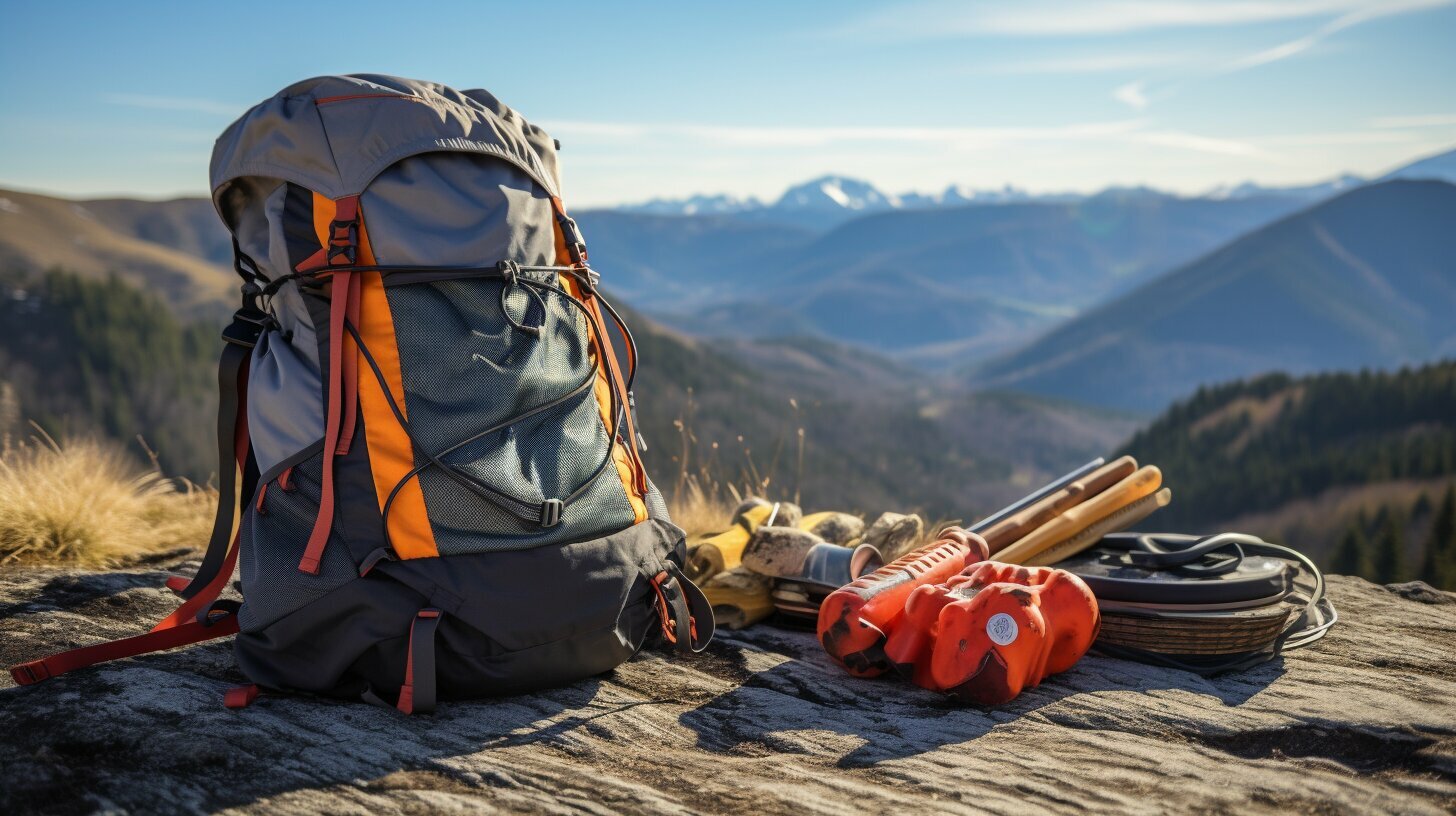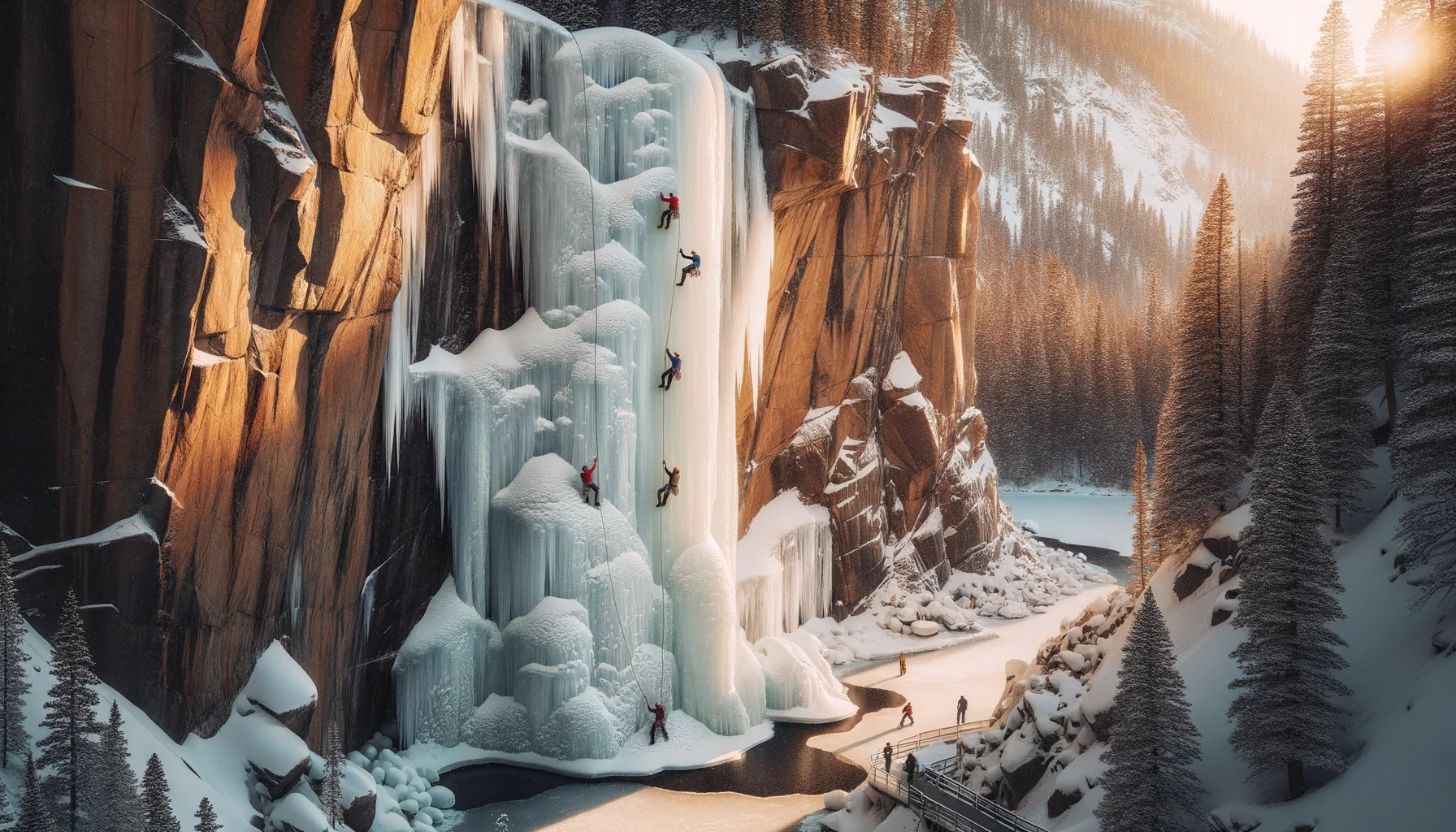If you’re looking for a new adventure that’ll take you outdoors and give you a great workout, hiking is the perfect option for you. Hiking is a low-impact exercise that can be enjoyed by people of all ages and fitness levels. Whether you’re a beginner or an experienced hiker, there’s always something new to explore on the trail.
In this beginner’s guide to hiking, we’ll provide you with all the essential information you need to start your hiking adventure. You’ll learn about the best gear to take with you, safety tips to keep in mind, beginner-friendly trails to explore, and much more. By the end of this guide, you’ll be ready to hit the trails and enjoy the great outdoors like never before!
Key Takeaways
- Hiking is a low-impact exercise that can be enjoyed by people of all ages and fitness levels.
- In this beginner’s guide to hiking, we’ll provide you with all the essential information you need to start your hiking adventure.
- You’ll learn about the best gear to take with you, safety tips to keep in mind, beginner-friendly trails to explore, and much more.
- By the end of this guide, you’ll be ready to hit the trails and enjoy the great outdoors like never before!
Getting Started with Hiking
If you’re new to hiking, getting started can seem overwhelming. But with a little preparation and the right mindset, you too can hit the trails and experience the beauty of nature. Here are some tips to help you start hiking for beginners.
Choose the Right Trail
When starting out, it’s important to choose a trail that matches your fitness level and hiking experience. Look for trails marked as beginner-friendly or easy. Research the trail’s length, elevation gain, and terrain to ensure it’s a good fit for you.
Disclosure: When you buy through links on our site, we may earn an affiliate commission.
Pro Tip: Start with shorter hikes to build up your endurance and comfort level before tackling longer treks.
Set Realistic Goals
Hiking is all about setting goals and achieving them. But it’s important to set realistic goals based on your fitness level and experience. Don’t push yourself too hard too soon, and remember to listen to your body.
Prepare Mentally and Physically
Before your first hike, take some time to mentally and physically prepare yourself. Get a good night’s sleep, eat a healthy meal, and consider doing some stretching or light exercise to warm up your muscles.
Pro Tip: Bring a friend or join a hiking group for added motivation and encouragement.
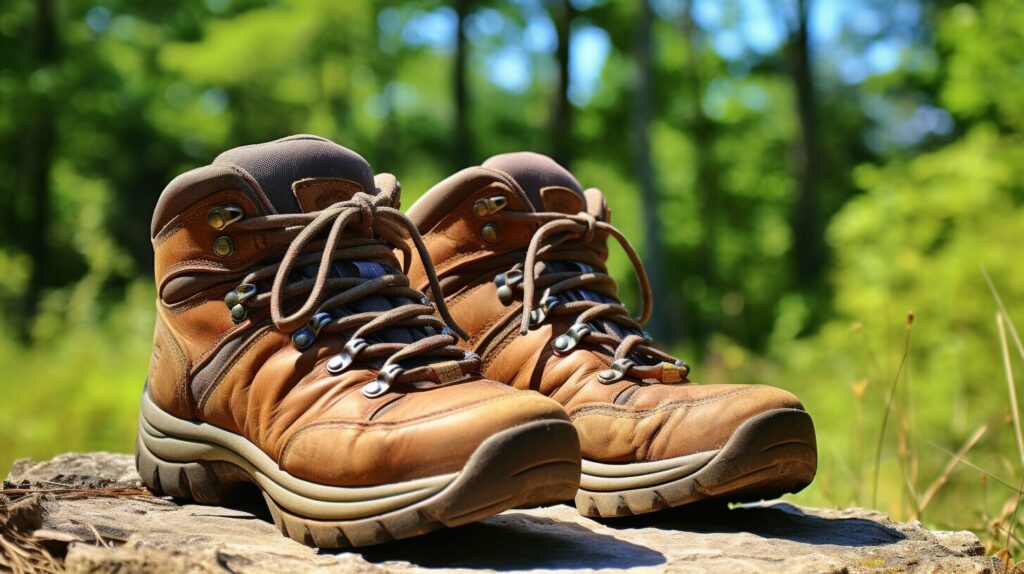
Now that you know how to get started with hiking, it’s time to hit the trails and start exploring. Remember to take it slow, stay hydrated, and enjoy the journey. Happy hiking!
Essential Hiking Gear for Beginners
Heading out on a hiking adventure can be exhilarating, but it is essential to have the right gear to ensure a safe and enjoyable experience. As a beginner, it can be overwhelming to figure out what equipment you need to bring with you on your hike. The following is a beginner hiking checklist of essential gear you should consider bringing with you:
| Item | Importance |
|---|---|
| Proper Footwear | High-importance |
| Clothing | High-importance |
| Backpack | High-importance |
| Navigation Tools | High-importance |
| Sun Protection | Medium-importance |
| First Aid Kit | Medium-importance |
| Emergency Shelter | Low-importance |
Note: The importance level is based on the gear’s significance for a safe and comfortable hike.
Proper Footwear: Having the right pair of hiking boots or shoes can make all the difference on the trail. Look for shoes with good ankle support, strong grip, and made of waterproof material.
Clothing: Dressing in layers is essential for any hiking trip. Wear clothing made of moisture-wicking material, such as merino wool or polyester, which will keep you dry and comfortable. Bring along a waterproof jacket to protect you from the elements.
Backpack: A durable and comfortable backpack is essential for carrying all your gear. Look for backpacks with adjustable straps, plenty of compartments for storage, and hydration system compatibility.
Navigation Tools: Bringing a map and compass is crucial for any hiking trip, especially if you plan to hike in areas without cell phone service. A GPS device or smartphone app with offline maps can also be useful.
Sun Protection: Don’t forget to bring sunscreen, a hat, and sunglasses to protect yourself from the sun’s harmful rays.
First Aid Kit: Accidents can happen on the trail, so it is essential to have a basic first aid kit with you. Include items such as bandages, pain relief medication, and antiseptic wipes.
Emergency Shelter: Although not always necessary, having an emergency shelter such as a lightweight tent or emergency blanket can provide protection in case of unexpected weather conditions or injury.
Make sure to double-check this beginner hiking checklist before heading out on your adventure. With the right gear, you can have a safe and enjoyable time exploring the great outdoors.
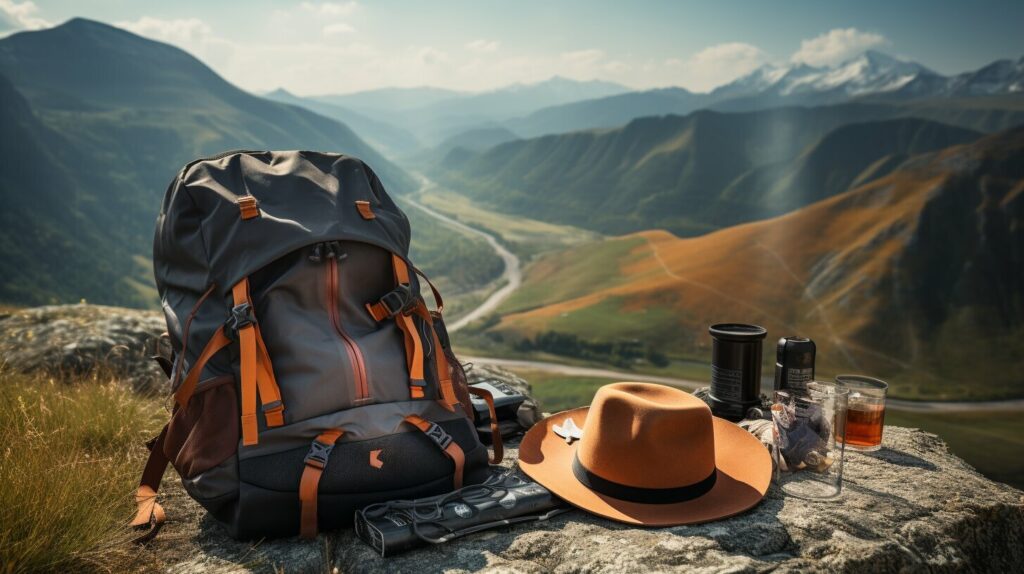
Hiking Tips for Beginners
Embarking on a hiking adventure can be exciting, but it can also be a daunting experience if you’re new to it. With these hiking tips for beginners, you’ll be well-equipped to tackle the trails with confidence.
Pace Yourself
When you’re new to hiking, it’s important to pace yourself and not push too hard. Start with shorter hikes and gradually increase your distance and difficulty level as your fitness and endurance improves. Remember, hiking is not a race, so take breaks when you need to and enjoy the scenery.
Stay Hydrated
Staying hydrated is essential when hiking, especially in hot or dry conditions. Make sure to carry enough water with you and drink regularly throughout your hike to prevent dehydration. A good rule of thumb is to drink at least one liter of water for every two hours of hiking.
Find Your Rhythm
Everyone has their own pace when hiking, so find your rhythm and stick to it. Whether you prefer a steady pace or taking breaks every few minutes, listen to your body and do what feels comfortable for you.
Navigate Different Terrains
Hiking trails can present various terrains, such as steep inclines, rocky paths, or slippery slopes. Use proper hiking techniques, such as keeping your center of gravity low and using trekking poles, to navigate different terrains safely and efficiently.
Use a Map and Compass
While GPS devices and smartphone apps can be helpful, it’s also important to know how to use a map and compass when hiking. Learn how to read a topographic map and use a compass to navigate your way through trails.
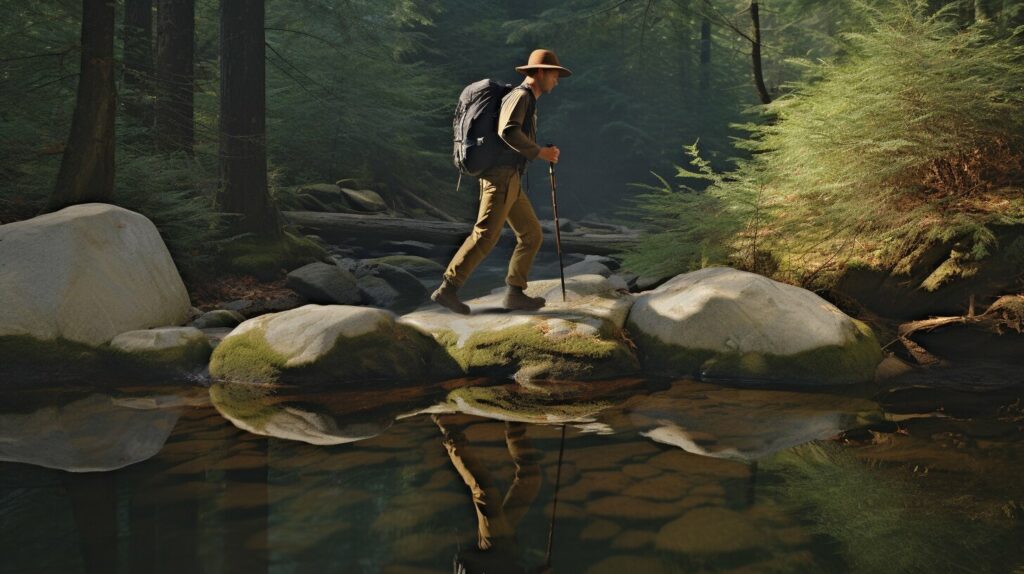
By following these hiking tips for beginners, you’ll be well-prepared and ready to tackle your first hiking adventure. Remember to stay safe, have fun, and enjoy the great outdoors!
Beginner-Friendly Hiking Trails
Choosing the right trail can make all the difference for beginner hikers. Look for trails with gentle inclines, clear paths, and beautiful scenery. Here are some beginner-friendly hiking trails across the United States that are a great starting point for your hiking adventure:
| Trail Name | Location | Difficulty Level | Features |
|---|---|---|---|
| Angel’s Landing Trail | Zion National Park, Utah | Easy | Spectacular views of Zion Canyon |
| Lower Yosemite Falls Trail | Yosemite National Park, California | Easy | Views of the tallest waterfall in North America |
| Canyon Trail | Emerald Bay State Park, California | Easy | Scenic views of Lake Tahoe |
| Devil’s Garden Loop Trail | Arches National Park, Utah | Moderate | Views of 8 arches and a natural tunnel |
| Alum Cave Trail | Great Smoky Mountains National Park, Tennessee | Moderate | Views of Mount LeConte and scenic overlooks |
Remember to do your research before choosing a hiking trail, and make sure it matches your skill level. You can find more beginner-friendly hiking trails in your area by checking out local hiking websites or talking to experienced hikers.

Hiking Safety Tips for Beginners
Whether you’re new to hiking or a seasoned pro, safety should always be your top priority. Here are some essential hiking safety tips for beginners:
- Be prepared: Before you hit the trail, make sure you have all the essential gear, including a map, compass, first-aid kit, and enough food and water for your trip. Check the weather forecast and dress appropriately for the conditions.
- Stay aware of your surroundings: Pay attention to any potential hazards on the trail, such as loose rocks, steep drop-offs, or slippery surfaces. Stay on designated trails to avoid getting lost or injured.
- Know your limits: Don’t push yourself too hard on your first few hikes. Start with shorter, easier trails and gradually work your way up to more challenging routes as you gain experience and confidence.
- Stay hydrated: Dehydration can be a serious problem when hiking, especially in hot weather. Drink plenty of water throughout your trip and pack extra water if you’re hiking in a remote area.
- Protect yourself from the sun: Wear sunscreen, a hat, and sunglasses to protect yourself from the sun’s harmful rays. UV exposure can lead to sunburn, dehydration, and other health problems.
- Leave no trace: Pack out all of your trash and dispose of it properly. Respect wildlife and nature by not disturbing plants or animals along the trail.
- Don’t hike alone: If possible, hike with a buddy or a group. Not only is hiking with others more fun, but it’s also safer in case of an emergency.
By following these hiking safety tips for beginners, you can have a safe and enjoyable hiking experience. Remember, the key to a successful hike is preparation, awareness, and respect for nature.
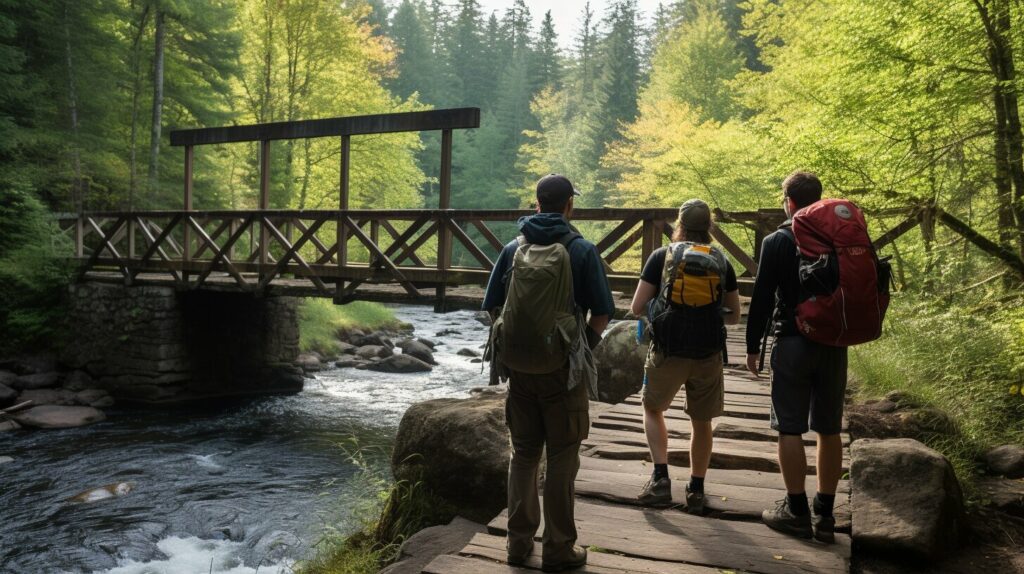
Hiking Etiquette for Beginners
As a beginner hiker, it’s important to remember that you’re sharing the trails with other hikers, wildlife, and nature itself. To ensure that everyone has an enjoyable experience while hiking, it’s essential to follow proper hiking etiquette. Here are some tips to help you get started:
| Tip | Description |
|---|---|
| Leave No Trace | Always pack out what you pack in and avoid damaging or disturbing natural features, plants, or wildlife. This includes staying on designated trails and avoiding shortcutting. |
| Yield to Other Hikers | If you’re hiking uphill, yield to hikers coming downhill. Bikers should always yield to hikers on shared trails. In general, slower hikers should yield to faster ones. |
| Respect Wildlife and Nature | Don’t approach or feed wildlife, and don’t disturb their natural habitats. Avoid making loud noises or playing music that can disrupt the natural environment. |
| Bring Your Own Water | Don’t rely on streams or other water sources for drinking water. Even if the water looks clean, it may contain harmful bacteria or parasites. |
By following these simple tips, you can help preserve the natural beauty of the trails and ensure that everyone has a safe and enjoyable hiking experience. Remember to always be courteous and respectful towards your fellow hikers and the environment, and you’ll be sure to make a positive impact on the hiking community.
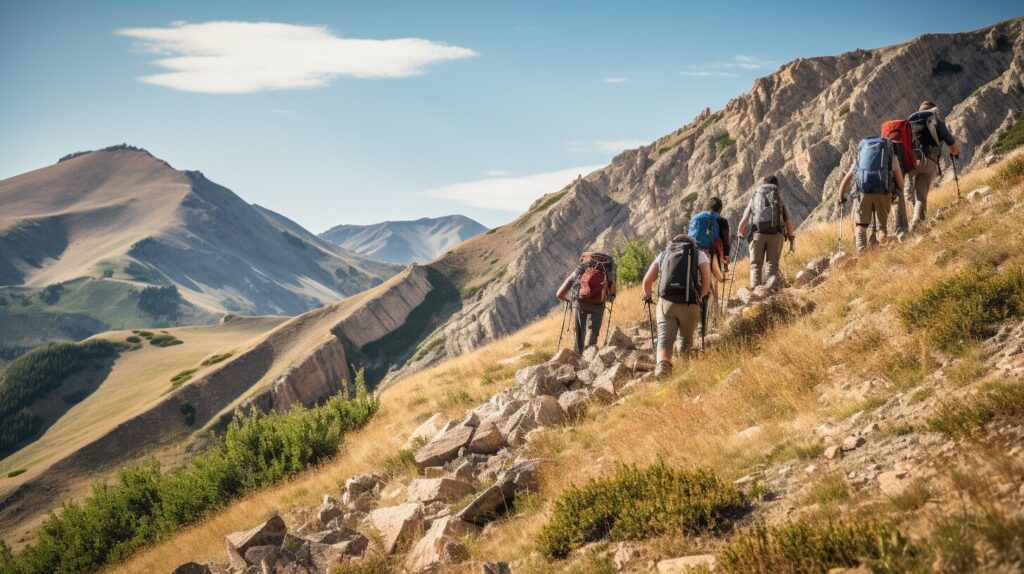
Hiking Nutrition and Hydration Tips for Beginners
One of the most important things to consider when planning a hiking trip is your nutrition and hydration. Proper fueling and hydration can make the difference between an enjoyable hike and a difficult one.
Here are some hiking nutrition and hydration tips for beginners:
- Bring plenty of water: Staying hydrated is key to a successful hiking trip. Bring enough water to last the entire trip, and consider bringing a water filtration system or purification tablets if you plan to refill your water bottles on the trail. Aim to drink at least 1 liter of water per hour of hiking.
- Pack snacks and meals: Hiking burns a lot of calories, so it’s important to bring plenty of snacks and meals to keep your energy levels up. Foods that are high in protein and carbohydrates are ideal for hiking. Some good options include trail mix, energy bars, jerky, and sandwiches.
- Don’t forget electrolytes: Electrolytes, such as sodium and potassium, are essential for proper muscle and nerve function. Bring along a sports drink or electrolyte tablets to help replace the electrolytes lost through sweat.
- Avoid alcohol and caffeine: Alcohol and caffeine can dehydrate you, so it’s best to avoid them while on the trail. Stick to water and sports drinks for hydration.
- Plan for timing: Be sure to eat a good meal before starting your hike, and plan to eat and drink regularly throughout your trip. Don’t wait until you’re hungry or thirsty, as this can lead to dehydration and low blood sugar.
By following these hiking nutrition and hydration tips, you’ll be well-fueled and hydrated for your adventure on the trails.
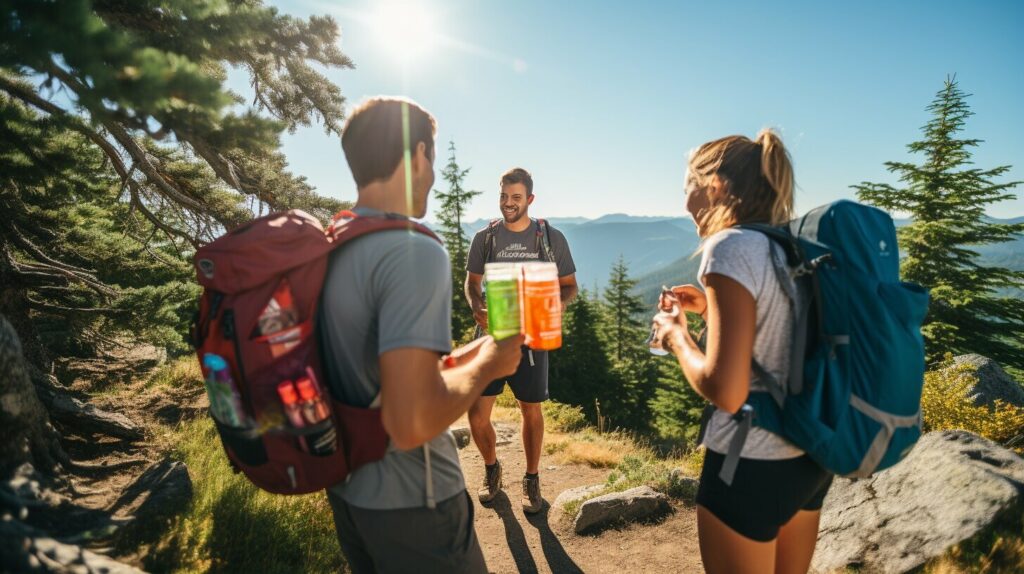
Hiking with a Group or Solo: Pros and Cons for Beginners
Deciding whether to hike with a group or go solo is a common dilemma for beginners. Each option has its pros and cons, so it’s important to consider what works best for you.
Hiking with a Group
If you’re new to hiking, joining a group can be a great way to get started. Some of the benefits of hiking with a group include:
- Increased safety, as there are more people to help in case of an emergency
- Motivation and support from other hikers
- Opportunities to socialize and make new friends
- Access to experienced hikers who can offer guidance and share their knowledge
However, hiking with a group also has its downsides. For example:
- You’ll need to coordinate with others to find a hike that works for everyone’s schedule and ability level
- You may have to compromise on the pace, route, or other aspects of the hike to accommodate the group
- You may encounter personality conflicts or differences in hiking style that can impact the overall experience
Hiking Solo
Hiking solo can be a rewarding and empowering experience for beginners, but it’s important to be prepared and take safety precautions. Some of the benefits of hiking solo include:
- Flexibility to choose your own pace, route, and schedule
- Opportunities for solitude and introspection
- A chance to challenge yourself mentally and physically
- Freedom to focus on your own goals and interests
However, hiking solo also has its drawbacks. For example:
- Increased risk, as there’s no one to help in case of an emergency
- Lack of motivation and support from other hikers
- No access to experienced hikers who can offer guidance and share their knowledge
- Potentially limited socialization opportunities
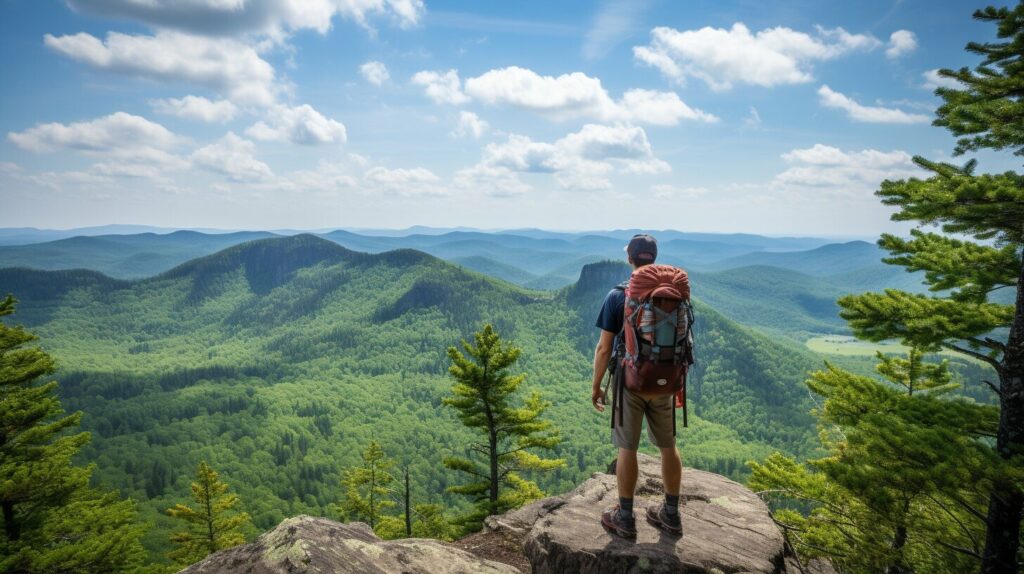
Ultimately, whether you choose to hike with a group or solo will depend on your individual preferences, goals, and comfort level. Some beginner hikers may feel more comfortable starting out with a group, while others may prefer the challenge and independence of hiking solo. No matter which option you choose, be sure to take the necessary safety precautions and enjoy the adventure!
Hiking Challenges for Beginners: How to Overcome Them
Hiking can be a challenging activity, especially for beginners. It’s important to understand that there will be obstacles to overcome during your hike, but with the right mindset and preparation, you can conquer them. Here are some common hiking challenges for beginners and tips on how to overcome them:
- Hiking fatigue: It’s common to experience physical and mental fatigue during a hike, especially when you’re not used to the activity. To combat this, start with shorter hikes and gradually increase your distance and elevation. Take breaks when needed and stay hydrated to keep your energy levels up.
- Navigating difficult terrain: Some trails may have steep inclines, rocky paths, or other obstacles that can be difficult to navigate. Make sure to wear appropriate footwear with good traction and use trekking poles if necessary. Take your time and watch your step to avoid injuries.
- Unexpected weather conditions: Weather can change quickly during a hike, and it’s important to be prepared for any situation. Check the forecast before heading out and pack extra clothing layers, rain gear, and sunscreen. If you encounter sudden weather changes, find shelter and wait until conditions improve.
Remember, hiking challenges can be overcome with the right mindset and preparation. Don’t be afraid to start small and work your way up to longer, more difficult hikes. With each new challenge you conquer, you’ll gain confidence and experience to tackle even more ambitious hikes in the future.
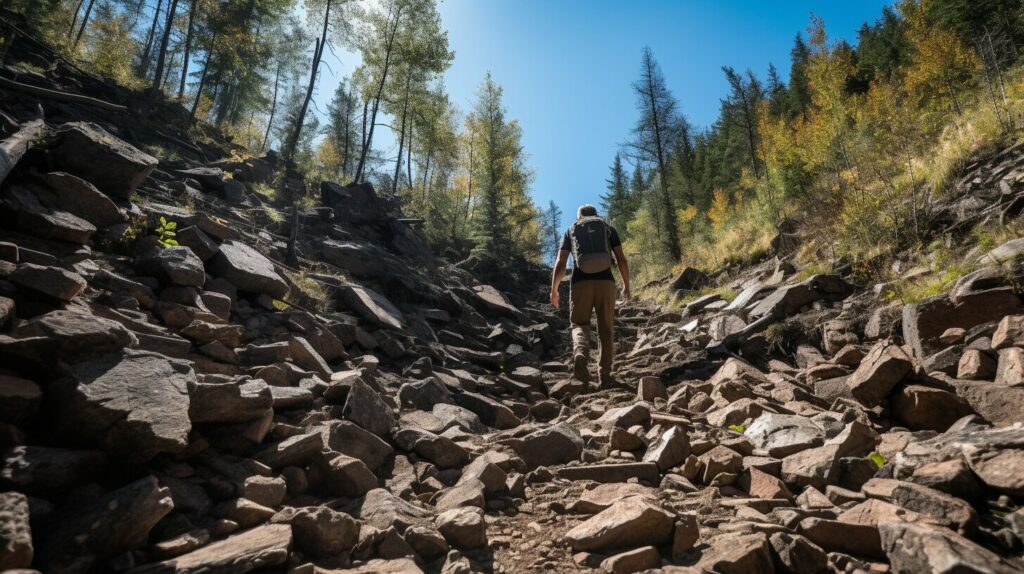
Conclusion
We hope you feel confident and excited to start your own hiking adventure. Remember to start small and choose trails that fit your skill level, wear appropriate clothing and footwear, and always prioritize safety.
With the right gear, preparation, and mindset, hiking can be an incredibly rewarding and enjoyable activity. Whether you prefer to hike solo or with a group, on easy or challenging trails, there’s something for everyone out there. So get out there, explore the great outdoors, and discover all the amazing sights and sounds that nature has to offer.
FAQ
Q: What are some essential hiking gear for beginners?
A: Some essential hiking gear for beginners include proper footwear, clothing layers, backpack, navigation tools (map, compass), sunscreen, insect repellent, and a first aid kit.
Q: What are some hiking tips for beginners?
A: Some hiking tips for beginners include pacing yourself, staying hydrated, wearing comfortable clothing and footwear, bringing snacks, and informing someone of your hiking plans.
Q: Are there any beginner-friendly hiking trails in the United States?
A: Yes, there are several beginner-friendly hiking trails in the United States. Some popular options include the Appalachian Trail, Pacific Crest Trail, and various national park trails.
Q: How can beginners stay safe while hiking?
A: Beginners can stay safe while hiking by being prepared, knowing their limits, staying aware of their surroundings, and following hiking safety guidelines such as staying on marked trails and carrying necessary safety equipment.
Q: What is hiking etiquette for beginners?
A: Hiking etiquette for beginners includes leaving no trace, yielding to other hikers, respecting wildlife and nature, and following any specific rules or regulations of the hiking trails or parks.
Q: What are some nutrition and hydration tips for beginner hikers?
A: Some nutrition and hydration tips for beginner hikers include packing nutritious snacks and meals, drinking plenty of water, and ensuring proper fueling before, during, and after the hike.
Q: Should beginners hike with a group or solo?
A: Whether to hike with a group or solo is a personal preference for beginners. Hiking with a group offers safety and companionship, while hiking solo allows for solitude and independence. Consider the pros and cons of each option before deciding.
Q: How can beginners overcome hiking challenges?
A: Beginners can overcome hiking challenges by preparing mentally and physically, building endurance gradually, learning proper techniques, and being adaptable to unexpected situations.

